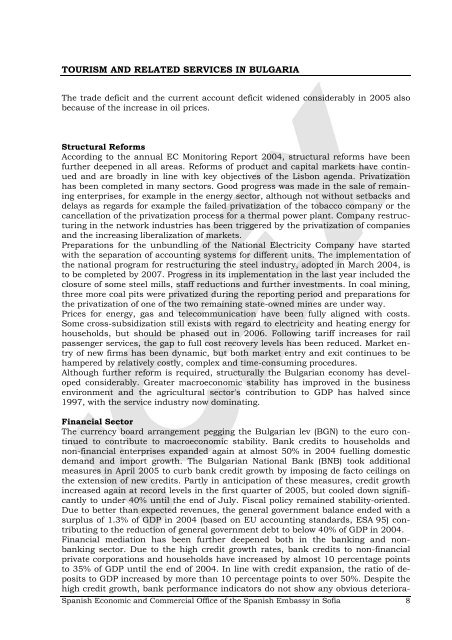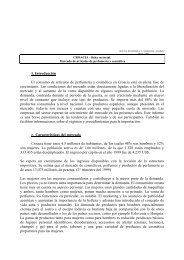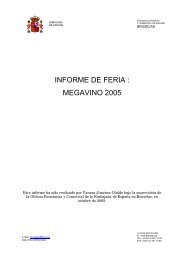Informes Sectoriales OP - Icex
Informes Sectoriales OP - Icex
Informes Sectoriales OP - Icex
You also want an ePaper? Increase the reach of your titles
YUMPU automatically turns print PDFs into web optimized ePapers that Google loves.
TOURISM AND RELATED SERVICES IN BULGARIA<br />
The trade deficit and the current account deficit widened considerably in 2005 also<br />
because of the increase in oil prices.<br />
Structural Reforms<br />
According to the annual EC Monitoring Report 2004, structural reforms have been<br />
further deepened in all areas. Reforms of product and capital markets have continued<br />
and are broadly in line with key objectives of the Lisbon agenda. Privatization<br />
has been completed in many sectors. Good progress was made in the sale of remaining<br />
enterprises, for example in the energy sector, although not without setbacks and<br />
delays as regards for example the failed privatization of the tobacco company or the<br />
cancellation of the privatization process for a thermal power plant. Company restructuring<br />
in the network industries has been triggered by the privatization of companies<br />
and the increasing liberalization of markets.<br />
Preparations for the unbundling of the National Electricity Company have started<br />
with the separation of accounting systems for different units. The implementation of<br />
the national program for restructuring the steel industry, adopted in March 2004, is<br />
to be completed by 2007. Progress in its implementation in the last year included the<br />
closure of some steel mills, staff reductions and further investments. In coal mining,<br />
three more coal pits were privatized during the reporting period and preparations for<br />
the privatization of one of the two remaining state-owned mines are under way.<br />
Prices for energy, gas and telecommunication have been fully aligned with costs.<br />
Some cross-subsidization still exists with regard to electricity and heating energy for<br />
households, but should be phased out in 2006. Following tariff increases for rail<br />
passenger services, the gap to full cost recovery levels has been reduced. Market entry<br />
of new firms has been dynamic, but both market entry and exit continues to be<br />
hampered by relatively costly, complex and time-consuming procedures.<br />
Although further reform is required, structurally the Bulgarian economy has developed<br />
considerably. Greater macroeconomic stability has improved in the business<br />
environment and the agricultural sector's contribution to GDP has halved since<br />
1997, with the service industry now dominating.<br />
Financial Sector<br />
The currency board arrangement pegging the Bulgarian lev (BGN) to the euro continued<br />
to contribute to macroeconomic stability. Bank credits to households and<br />
non-financial enterprises expanded again at almost 50% in 2004 fuelling domestic<br />
demand and import growth. The Bulgarian National Bank (BNB) took additional<br />
measures in April 2005 to curb bank credit growth by imposing de facto ceilings on<br />
the extension of new credits. Partly in anticipation of these measures, credit growth<br />
increased again at record levels in the first quarter of 2005, but cooled down significantly<br />
to under 40% until the end of July. Fiscal policy remained stability-oriented.<br />
Due to better than expected revenues, the general government balance ended with a<br />
surplus of 1.3% of GDP in 2004 (based on EU accounting standards, ESA 95) contributing<br />
to the reduction of general government debt to below 40% of GDP in 2004.<br />
Financial mediation has been further deepened both in the banking and nonbanking<br />
sector. Due to the high credit growth rates, bank credits to non-financial<br />
private corporations and households have increased by almost 10 percentage points<br />
to 35% of GDP until the end of 2004. In line with credit expansion, the ratio of deposits<br />
to GDP increased by more than 10 percentage points to over 50%. Despite the<br />
high credit growth, bank performance indicators do not show any obvious deteriora-<br />
Spanish Economic and Commercial Office of the Spanish Embassy in Sofia 8

















